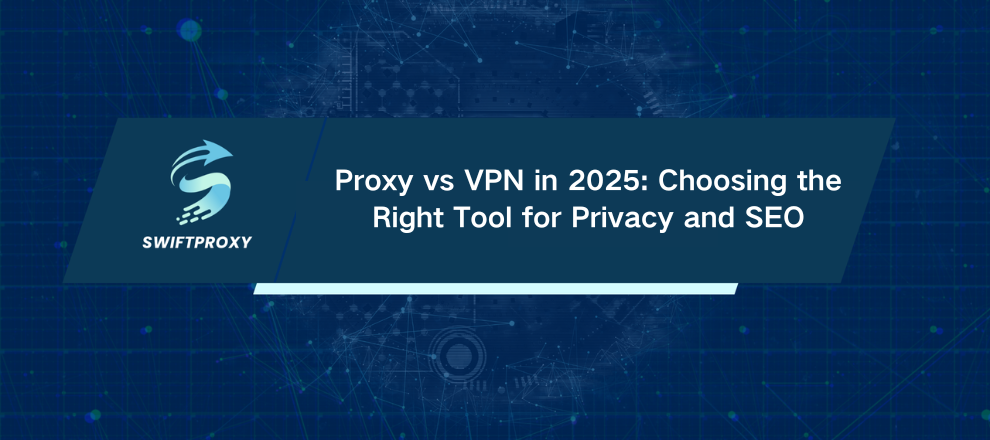Proxy vs VPN in 2025: Choosing the Right Tool for Privacy and SEO
The digital world in 2025 is ruthless. One wrong click can expose sensitive data. One overlooked strategy can tank your SEO efforts. Every marketer, developer, and privacy-conscious user faces the same dilemma—deciding between a proxy and a VPN. Choosing the right tool is not just a technical decision but a strategic one. The wrong choice can cost time, data, and even revenue. Both proxies and VPNs mask your IP address. But that’s where the similarity ends. VPNs encrypt traffic, securing your entire online activity. Proxies, on the other hand, act as task-specific middlemen—perfect for scraping websites, testing multiple accounts, or analyzing geo-specific search results. Understanding these nuances can help you optimize privacy, boost SEO performance, and avoid costly mistakes.

What Is a Proxy and How It Functions
Think of a proxy as a middleman between your device and the internet. When you use a proxy, your real IP address is hidden. To websites, you appear as if you're browsing from a completely different location.
Proxies shine in scenarios like:
Local SEO checks: Want to see how your website ranks in Tokyo without flying there? Proxies make it possible.
Web scraping: Automate data collection safely, without triggering IP bans.
Account management: Run multiple social media or email accounts without being flagged.
Swiftproxy, for example, offers residential proxies. Fast, reliable, and scalable—they're perfect for marketers who need speed, accuracy, and security in their SEO operations.
What Is a VPN and How It Functions
VPNs, or Virtual Private Networks, encrypt all your internet traffic. This makes your browsing private and secure, even on public Wi-Fi. Unlike proxies, VPNs focus on overall privacy rather than task-specific performance.
VPNs excel at:
Protecting sensitive data: Keep your banking, corporate communications, and personal files safe.
Accessing restricted content: Stream or research from anywhere in the world.
Safe public Wi-Fi usage: Encryption shields you from hackers lurking on unsecured networks.
The downside? VPNs are slower due to encryption, and shared IPs make them less suitable for large-scale SEO automation. Still, for privacy-conscious users, they are indispensable.
Key Differences Between Proxies and VPNs in 2025
Here's a clear picture of how the two compare:
Speed and Performance
Proxies are faster for non-sensitive tasks like scraping and rank tracking.
VPNs are slower because encryption adds overhead—but your data is secure.
Security Level
Proxies hide your IP but leave traffic unencrypted. Use them for tasks where speed matters more than privacy.
VPNs encrypt everything, protecting sensitive activities and personal data.
SEO Utility
Proxies are essential for automated SEO tasks requiring multiple IPs.
VPNs struggle with automation due to shared IPs and potential restrictions.
Cost
Proxies are affordable and scalable for business automation.
VPNs can be pricier, especially premium services—but worth it for privacy.
Why Proxies Dominate SEO in 2025
If SEO is your priority, proxies are non-negotiable.
Geo-targeting: Test keywords and track SERPs in any location.
IP safety: Perform repetitive SEO tasks without risking bans.
Automation-friendly: Run scripts and scraping tools efficiently.
Task flexibility: Rotate multiple proxies for different projects.
Swiftproxy offers high-quality residential proxies, combining speed with reliability—critical for research, competitor analysis, and content scraping.
Why VPNs Remain Important
Even if SEO dominates your workflow, privacy cannot be ignored. VPNs provide:
Encrypted traffic: Protect sensitive data like passwords, banking info, and company communications.
Safe public network usage: Shield yourself from hackers at coffee shops and airports.
Access to restricted content: Stream, research, or interact with international web services without barriers.
Compliance with regulations: VPNs help meet GDPR and other data protection standards.
Think of VPNs as a shield for your personal security, while proxies are your SEO toolkit. Together, they cover all bases.
Choosing the Right Tool in 2025
Your choice depends entirely on your goals:
SEO-focused: Invest in proxies with multiple IPs, reliability, and speed. Swiftproxy has tailored solutions for rank tracking and automation.
Privacy-focused: Opt for VPNs with strong encryption, strict no-log policies, and fast servers.
Mixed-use: Use proxies for automated tasks and VPNs for sensitive browsing. This combination maximizes both security and efficiency.
Conclusion
Proxy vs VPN in 2025 isn't about picking a winner—it's about knowing what each tool does best. For SEO, proxies deliver speed, flexibility, and dedicated IPs. For online privacy, VPNs offer encryption and protection. Used together, they give marketers, developers, and privacy-conscious users the ultimate edge.

















































